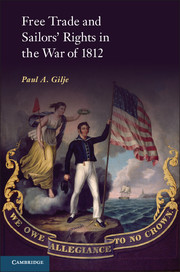17 - Politics of War
Published online by Cambridge University Press: 05 March 2013
Summary
In 1812 Porter's motto quickly became central to the politics of the war. One of the appeals of free trade and sailors’ rights was that it simplified the war aims in an explosive political environment – an environment that became so contentious that it made the war almost impossible to fight. Not only did the Madison administration face ardent opposition from the Federalist Party, it often confronted obstruction from dissidents and factions within the Republican Party. Amid the debates over funding the war, peace initiatives, even resolutions on minor points of information, Congress repeatedly revisited the origins of the war. These debates often hinged on the ideas and words embedded in Porter's motto. Beyond the halls of Congress, free trade and sailors’ rights appeared as a powerful political slogan for Republicans. So potent was the phrase that Federalists even sought to use the rhetoric for their own purposes. When they failed, the Federalists turned to the slogan as a means of exposing the hypocrisy of the Republicans.
Historians often misrepresent politics in the years leading up to the War of 1812. Although it is possible, and at times useful, to discuss politicians as supporting either the Republicans or the Federalists, this two-party division fails to capture the intricate and fluid nature of the political divisions. Both parties were riven by factions that often relied on personal allegiances and connections as well as ideology. As the dominant political force, the Republicans were especially divided, forming multiple factions organized around both people and policy. There were Republicans, referred to as the “invisibles” or “malcontents,” who rejected Madison's reliance on diplomacy and economic coercion after 1809 and wanted to move the nation toward war. This group included the Smith brothers – Senator Samuel Smith and Secretary of State Robert Smith – of Maryland, the Nicholas family in Virginia, William Duane and Michael Leib of Pennsylvania, as well as the Clintons (George and DeWitt) in New York. Allied with the Clintons was John Armstrong, who had been ambassador to France and had accepted the Cadore letter. There was also a group of “Old Republicans,” headed by James Monroe, who did not want tougher measures and who still hoped to find a negotiated settlement.
- Type
- Chapter
- Information
- Free Trade and Sailors' Rights in the War of 1812 , pp. 228 - 243Publisher: Cambridge University PressPrint publication year: 2013



